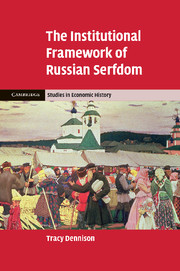Book contents
- Frontmatter
- Contents
- List of figures and tables
- Preface
- A note on the value of the rouble
- A note on transliteration
- List of abbreviations
- Glossary
- Map: Yaroslavl' and surrounding provinces
- 1 Why is Russia different? Culture, geography, institutions
- 2 Voshchazhnikovo: a microcosm of nineteenth-century Russia
- 3 Household structure and family economy
- 4 The rural commune
- 5 Land and property markets
- 6 Labour markets
- 7 Credit and savings
- 8 Retail markets and consumption
- 9 The institutional framework of Russian serfdom
- Bibliography
- Index
6 - Labour markets
Published online by Cambridge University Press: 03 May 2011
- Frontmatter
- Contents
- List of figures and tables
- Preface
- A note on the value of the rouble
- A note on transliteration
- List of abbreviations
- Glossary
- Map: Yaroslavl' and surrounding provinces
- 1 Why is Russia different? Culture, geography, institutions
- 2 Voshchazhnikovo: a microcosm of nineteenth-century Russia
- 3 Household structure and family economy
- 4 The rural commune
- 5 Land and property markets
- 6 Labour markets
- 7 Credit and savings
- 8 Retail markets and consumption
- 9 The institutional framework of Russian serfdom
- Bibliography
- Index
Summary
The preceding chapters have shown that the commune, and especially communal land, played a very different role in Voshchazhnikovo from the classic Chayanovian role assigned it in the Peasant Myth. Some scholars would argue that a Chayanovian peasant economy might still obtain in such an environment, since Chayanov's theory was, at least in some instances, compatible with the existence of rural land markets. Labour markets, however, are more difficult to reconcile with a Chayanovian economic framework. Chayanov himself maintained that ‘on the family farm which has no recourse to hired labour, the labour force pool, its composition, and degree of labour activity are entirely determined by family composition and size’.
This is thought to have been especially true for Russia, where communal land tenure and repartitioning practices are thought to have substituted for markets in labour. As one historian has noted, ‘instead of family members moving in and out of the household through wage labour, sharecropping, tenancy, apprenticeship, or service in the attempt to adjust to changes in household composition and status, it was the land that moved around’. According to this view, the labour force in rural Russia was determined by family size, and communal land allotments were adjusted in accordance.
- Type
- Chapter
- Information
- The Institutional Framework of Russian Serfdom , pp. 149 - 180Publisher: Cambridge University PressPrint publication year: 2011



